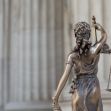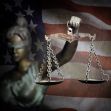Senate judiciary meetings for President Donald Trump’s newest nominee for the U.S. Supreme Court, Judge Amy Coney Barrett, have concluded, with a committee vote set for October 22. The proximity of her potential confirmation to the upcoming election sparked immediate controversy, including several calls for Barrett to recuse herself from cases directly involving the election.
“Recusal” isn’t as widely familiar as other running themes in Barrett’s hearings, like abortion rights and healthcare. However, recusal was brought up several times as a potential remedy to a damaging public opinion: some worry Mr. Trump’s selection of Barrett is maliciously intentional, explicitly meant to boost his personal agenda in the courts this November and beyond.
Several cases central to the current administration’s campaign will soon face the Supreme Court, including the Affordable Care Act (and the consequences for pre-existing conditions during a post-COVID-19 world) and DACA. Perhaps most notably and most urgently, the 2020 general election results are also likely to be on the table, a matter in which Barrett could play a key role if confirmed. The possibility of recusal from such a case sparked immediate debate among politicians.
“She doesn’t have a legal conflict,” said South Carolina Senator and Senate Judiciary Committee Chairman Lindsay Graham. “She doesn’t decide the election. She’s just a vote like everybody else.”
However, a distinctive approach was brought up by Delaware Senator Chris Coons. He pointed out Mr. Trump’s “very, very clear” personal intentions for pushing Barrett’s early confirmation, referencing the President’s repeated statements on the matter.
“I think it’s better if you go before the election because I think this scam that the Democrats are pulling — it’s a scam — the scam will be before the United States Supreme Court,” Trump predicted on September 23.
“I think having the four-four situation is not a good situation if you get that,” he said. “I don’t know that you’d get that. I think it should be eight-nothing or nine-nothing. But just in case it would be more political than it should be, I think it’s very important to have a ninth justice.”
Some Republican officials have echoed his calls for a nine-justice Supreme Court before the election. Borne from Trump’s anticipatory doubt for the election results, the 2020 election is anticipated to play out like a modern version of Bush v. Gore, in which the Court halted Florida’s ballot recount and effectively decided the American Presidency.
“You’re right that the statute does require a Justice or judge to recuse when there’s an appearance of bias,” Barrett answered Coons, with particular emphasis on appearance. She then committed to considering all factors of the appearance of bias just as seriously as “actual bias” if she is confirmed.
Barrett also mentioned that her legal record is absent of any indicators that could reasonably predict her legal bearings on election results. However, some of her history indicates otherwise.
If Barrett is confirmed, she will be the third sitting Justice on the Supreme Court to have offered legal aid of some level to the Bush side of Bush v. Gore. Barrett, along with now-Chief Justice John Roberts and Trump-appointed Associate Justice Brett Kavanaugh, traveled to Florida as legal counsel amidst the multitude of election court cases scattered throughout the state.
The full extent of Barrett’s involvement in the case is unknown, beyond that she was a member of the 2000 Bush legal team in Florida while in private practice. She said in previous hearings that she has no surviving paperwork from her time on the case.
In general, judges may recuse themselves if their “impartiality might reasonably be questioned,” typically through familial or financial connection to the case. It is practiced throughout the federal court system, and technically applies to the Supreme Court as well. Justice Elena Kagan sat out of nearly 30 cases in her first year on the Supreme Court.
Justice Antonin Scalia helped define recusal parameters in 2004 by distinguishing what would be at stake. If a friend’s wealth or “personal freedom” is on the table, the Justice should recuse; “where official action is at issue,” according to Scalia, such is not an adequate reason for recusal.
In the 2009 case of Caperton v. Massey Coal, Justice Anthony Kennedy wrote for the majority that a recusal must be considered if a judges’ “probability of actual bias” is “too high to be constitutionally tolerable.”
In his opinion, Kennedy refers to the Due Process Clause of the Fourteenth Amendment, which prohibits denying “any person of life, liberty, or property, without due process of law.” In the Caperton case, the Justice in question had taken copious campaign contributions from the corporation in the case. The facts of the case that warranted the recusal, Kennedy said, were “extreme.”
Justice Roberts has also noted that recusal should not be used frivolously. “(I)f a Justice withdraws from a case, the Court must sit without its full membership,” he wrote. “A Justice accordingly cannot withdraw from a case as a matter of convenience or simply to avoid controversy.”
“Rather,” Roberts added, “each Justice has an obligation to the court to be sure of the need to recuse before deciding to withdraw from a case.”
The terms of a potential recusal in Barrett’s case would not, according to Justice Kennedy’s depiction, likely qualify as “extreme facts,” despite Justices Roberts and Scalia having written in dissent that Kennedy’s definition of “probability of bias” and “extreme facts” were too vague to be of valuable precedence.
However, there is still discussion regarding whether the situation could be regarded as “extreme” enough in other ways to necessitate her recusal. Though Barrett’s (and Trump’s) supporters see little relation between the cases that would warrant the decision to recuse, Democrat Minority Leader Senator Chuck Schumer and Connecticut Senator Richard Blumenthal said her ties could present “serious conflicts of interest.”
“Your participation…in any case involving Donald Trump’s election would do explosive harm to the court’s legitimacy and to your own credibility,” Blumenthal said.
If Barrett is confirmed, the “appearance of bias” may be the most significant—though most abstract—argument in the case for her recusal. Predominantly due to Mr. Trump’s statements, Barrett may be viewed as a distinct potential for partiality concerning the election’s imminent legal battles. That public perception will be pitted against her duty to sit on the High Court as the election unfolds.






